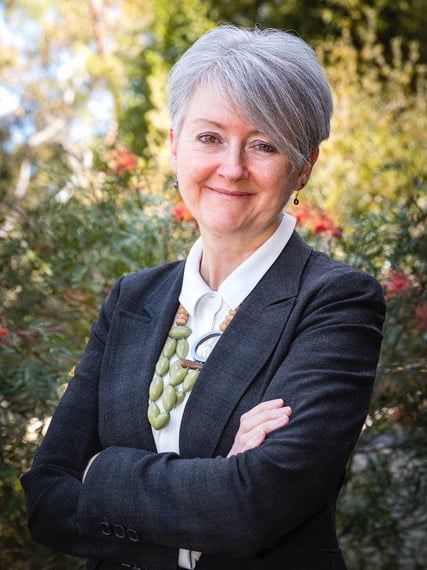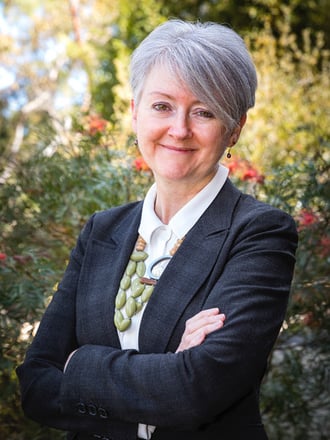Leaving a sustainable legacy

Dr Annette Davison, winner of the Australian Water Association's 2021 Water Professional of the Year award, shares what this year's National Water Week theme of "Caring for water and Country" means to her and the water sector.
I grew up in the Yorkshire Dales in the UK, a region highly influenced by limestone and water. The geography of the place — the way the landscape looks — has largely been formed by water. Growing up, that water-shaped landscape was very much a part of me. It still is.
When I first came to live in Sydney, I couldn’t believe how much water there was; everywhere I went, there was water at every turn — rivers, bays and harbours. Now I am fortunate to live on the edge of Garigal National Park, part of the catchment for Warringá (Middle Harbour).
The theme of this year’s National Water Week is "caring for water and Country". Reflecting on this theme now, I can see that my journey of caring for water and country started pretty early. But it wasn’t until a few years ago that my awareness began to develop of how, for Indigenous peoples, caring is a lived experience.
Part of my role as National Water Week Ambassador is to help create more awareness of the Indigenous role in caring for water and Country and in managing water more sustainably. It’s also my role to help make sure that people understand the importance of the whole water cycle within a complex context including equal consideration of many aspects such as resource, economy, environment, society and culture.
Water is the universal solvent; it’s critical for everything we do and we can’t divorce water management from its context. My ambassador role is crucial in helping to ensure these contextual interconnections are understood and given the importance they deserve in planning for a truly water secure future.
Building awareness
It is a source of shame to me that I was previously unaware that I live on Guringgai Country. It wasn’t until I found out from my fellow National Water Week Ambassador Phil Duncan, that I became aware of the correct First Nations' connections on this land, rather than what I had been led to believe from my own attempts at research, which was Darug country.
It made me think about the huge opportunity to correct this uncertainty and develop accessible resources to facilitate a wider understanding of First Nations’ Country and significant waterways. Only when we improve this awareness will we be able to move forwards.
By introducing awareness of First Nations culture at this basic level, we are inviting others to start paying more attention. New Zealand has done a lot of work with awareness, including integrating Maori culture and language, even granting the Whanganui River the same legal rights as a human being! Here in Australia, we’re just not there yet — but it does give us a lot of scope for improvement!
If we, as a country, but also us in the water sector, could start to nurture that awareness, including the cultural values and knowledge of Indigenous people, it will help us to make sure all of our work and projects take a more holistic view in design, development and deployment.
If we can do that, we will reach a much greater understanding of how to care for water and Country and come up with solutions that better fit the whole context, not just the infrastructure context.
Sustainability and context
My work in the water sector is in risk management, and I’m all about context. Context always involves many different factors, whether it’s water quality, water quantity, operations, maintenance or culture. A solution cannot be said to be truly sustainable unless its context has been understood and taken into account. One project can have many different objectives that need to be achieved, all of which must be shaped by a contextual understanding.
I’m proud to say that my company D2K Information is working with a number of partners, including RMIT, University of Queensland and University of Western Australia, in partnership with the Mulga Queen Community, and the Western Desert Kidney Health Project, to develop a contextually appropriate water supply and management solution for the community as well as training a number of students in this approach.
Sustainability also starts from the ground up. With my friend Sarah Logan I co-founded a social initiative called OneStreet. Through Risk Edge and OneStreet, we have been spending time at schools and with other groups, speaking about sustainability and the urban water cycle. Our aim is to increase peoples’ awareness of the urban water cycle, to increase connection, help people understand where they fit in, understand where their water comes from — and also where it goes!
When we founded OneStreet, we had a serious think about the things that were important to us, and we came up with three principles.
The first is be kind to yourself, because we need to ensure we have our own oxygen masks on before we can help others. The second and third principles are be kind to your community and be kind to your environment. These three principles together work in relation to any aspect of what we do. Are we being kind to ourselves and the communities that we work within? Are we being kind to the environment?
Considering our work from this perspective allows us to ensure that we are doing more good and not just, less harm.
Kindness is a very soft word. It's not a word that we're used to using in the science and engineering space, and I think we need to get better at being more gentle and caring, in the work that we do. It's what I call the Jacinda Ardern approach.
There's a lot of really good work coming out of the water industry now with commitments to Indigenous inclusion, but we can all do more to get behind it, and I think bringing in this kindness angle will help us all as we work towards more sustainable solutions to the challenges we are facing.
To finish off on sustainability, there are two aspects that really pop out for me. Number one is learning from things. What are the learnings that we can take from a project to allow goodness to be repeated and mistakes to be minimised or eliminated?
The other aspect is making sure that we're training people and creating awareness, and that starts with nurturing young people to have a greater awareness of their context, not only in relation to water, but what it actually means to care for water and Country.
If we can get these parts right, we are in a good position to enable a truly water secure future — for self, for community and for the environment.



